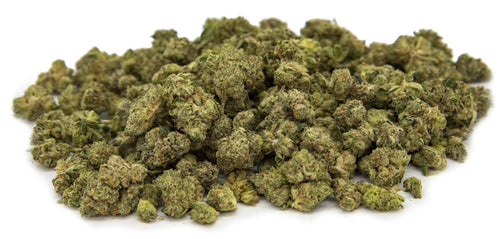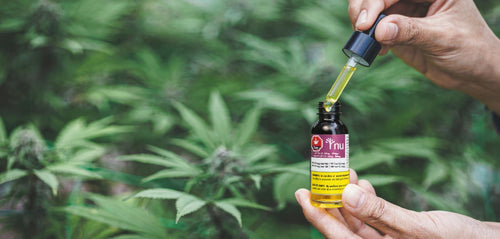#142: Minor Cannabinoids, Major Impact: The Next Frontier in Cannabis Medicine
#142: Minor Cannabinoids, Major Impact: The Next Frontier in Cannabis Medicine
While CBD and THC have dominated headlines for years, there's a fascinating world of minor cannabinoids quietly revolutionizing medical cannabis. These lesser-known compounds, from CBG to CBN and CBC, have shown therapeutic potential in treating a variety of health conditions. Think of them as the specialized tools in your cannabis toolkit, each designed for specific jobs that the major cannabinoids can't quite handle alone.
What makes these minor cannabinoids so compelling isn't just their individual effects, but their ability to work synergistically with other cannabis compounds through the entourage effect. As research accelerates and extraction techniques improve, we're discovering that these "minor" players might actually be major game-changers in the world of cannabis medicine. Ready to meet the next generation of cannabis therapeutics?
CBG: The mother of all cannabinoids

Cannabigerol (CBG) has earned its nickname as the "mother of all cannabinoids" because its precursor, CBGA, serves as the building block for THC, CBD, and other cannabinoids as the plant matures. Think of it as the stem cell of cannabinoids.
Unlike its famous offspring, CBG works through completely different pathways in your body. It's the only known cannabinoid that acts as a CB1 antagonist and CB2 partial agonist. To put it simply, CBG has the potential to interact with both your central and peripheral nervous systems, which could lead to a variety of therapeutic benefits.
Research shows that CBG can:
Reduce inflammation: Studies suggest that CBG might help reduce inflammation, making it a potential option for managing conditions like inflammatory bowel disease (IBD).
Support neuroprotection: Preliminary research indicates that CBG could protect nerve cells, offering hope for neurodegenerative disorders such as Huntington's disease.
Fight bacterial infections: CBG has demonstrated strong antibacterial properties, particularly against resistant strains like MRSA.
Enhance appetite: Unlike other cannabinoids, CBG has shown promise in stimulating appetite, which could be of benefit to individuals with eating disorders or recovering from illness.
Relieve pain: Its interaction with CB1 and CB2 receptors could also contribute to pain management, providing an alternative to conventional treatments.
Focus and alertness: Studies have shown that it can increase dopamine levels in the brain, leading to improved cognitive function and alertness.
CBG's potential in treating a wide range of conditions is still being researched, and the results so far have been promising. With its unique properties and interactions with our body's endocannabinoid system, CBG could offer a natural and more holistic approach to managing various health issues.
CBN: Nature's sleep aid

Cannabinol (CBN) is one of cannabis's most intriguing cannabinoids. It's not directly produced by the plant, but forms as THC degrades over time through exposure to heat, light, and oxygen. This transformation creates a compound with remarkable sleep-promoting properties that have caught the attention of both researchers and insomniacs worldwide.
Recent research using polysomnography (the gold standard for sleep studies) has validated what cannabis users have long suspected: CBN significantly improves sleep quality. In controlled studies, CBN increased total sleep time, enhanced both NREM and REM sleep phases, and improved sleep stability with effects comparable to the prescription sleep aid Zolpidem.
What makes CBN so interesting is its active metabolite, 11-hydroxy-CBN, which CB1 receptors in the brain respond to. This means that CBN not only has sedative effects but also can impact the endocannabinoid system, which regulates numerous physiological processes, including sleep.
Unlike many sleep medications, CBN appears to be best suited for sleep maintenance rather than sleep initiation. This makes it ideal for people who fall asleep easily but struggle with frequent awakenings or early morning wake-ups. Some users find an initial slight alertness, followed by sustained sleepiness that lasts longer than conventional sleep aids.
Clinical trials are currently underway testing 30mg and 300mg doses of CBN in humans with insomnia disorder. Preliminary results show that CBN with small amounts of THC can improve sleep quality and reduce sleep disturbances.
CBC: The anti-inflammatory powerhouse

Cannabichromene (CBC) might be the most underappreciated cannabinoid in the cannabis plant, despite its promising therapeutic potential. It is the third-most abundant cannabinoid, but its effects are not as widely studied or understood as THC or CBD.
CBC's anti-inflammatory properties are what set it apart from the other cannabinoids. What's really interesting is that CBC's anti-inflammatory effects seem to work through different pathways than THC, which suggests synergetic potential by using the two. This could be significant, as THC's psychoactive effects can sometimes be too intense for some individuals.
The compound shows significant promise for pain management, especially inflammatory pain conditions like arthritis. In animal studies, CBC was effective in both acute and chronic pain scenarios, making it potentially valuable for patients seeking alternatives to traditional pain medications.
CBC plays a vital role in supporting neurological health by promoting neurogenesis, which is the growth and development of nervous tissue. Beyond its benefits for the brain, CBC also has powerful antibacterial and antifungal properties, making it an effective topical solution for managing skin conditions like acne and eczema.
Finding the right dose

Unlike CBD and THC, minor cannabinoids pose unique dosing challenges due to limited clinical research and individual variations in cannabinoid sensitivity. For instance, CBG is generally effective in doses ranging from 5-20mg, though some users report noticeable benefits at even lower amounts, especially when it comes to focus and overall wellness.
CBN for sleep appears most effective in the 30-300mg range based on current research, though many products contain much lower doses. Starting with 2.5-5mg and gradually increasing allows users to find their optimal dose while minimizing potential morning drowsiness.
CBC dosing in humans is still largely uncharted territory, though animal studies indicate it can be effective at relatively low doses when used alongside other cannabinoids. Currently, most CBC products emphasize topical applications or full-spectrum formulations to maximize its potential benefits.
At Herbal Dispatch, you can shop for minor cannabinoids by selecting a cannabinoid in the "Categories" dropdown section of the category page. With over 80 products that contain CBC, CBD and CBN, the right product for your needs is just a click away.
The future of minor cannabinoids
While CBD and THC have long dominated the spotlight in cannabis-based medicine, CBG, CBN, and CBC are quickly emerging as the next wave of therapeutic innovation. Thanks to advancements in extraction technology and a growing body of research, these minor cannabinoids are transitioning from niche topics to promising solutions with big-time potential.
As the cannabinoid toolkit continues to expand, understanding these novel compounds places you at the cutting edge of personalized cannabis medicine. The ideal cannabinoid blend for your needs might just include one or more of these emerging minor cannabinoids.
Back to all posts









